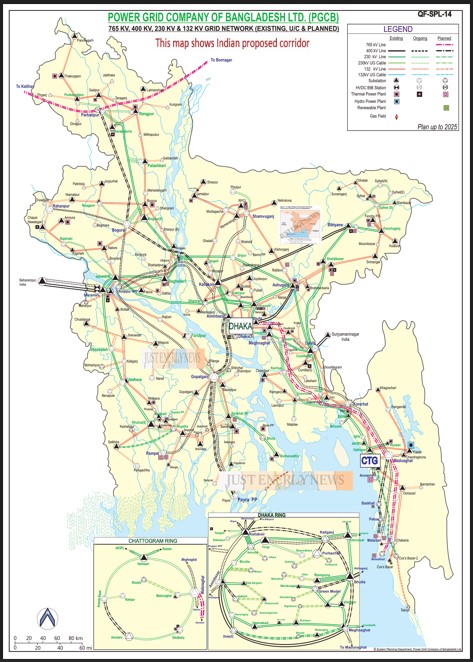Bangladesh is expected to reject India’s proposal to build a 117-kilometre, 765kV high-voltage power corridor through its territory, despite New Delhi’s strong push for a seamless electricity link between Bornagar in Meghalaya and Katihar in Bihar.
The Indian side proposed to begin implementation of the project early this year and plans to complete it by 2028.
In exchange, India has proposed to supply an additional 1,000MW of electricity to Bangladesh, along with 500MW already being imported.
Officials said the World Bank and the Asian Development Bank (ADB) have also urged Bangladesh to move forward with the project, offering potential funding.
However, Bangladesh is reviewing the proposal carefully, citing security and environmental concerns. Local protests in Arunachal Pradesh have already erupted over a planned dam intended to generate hydroelectricity for the proposed corridor.
Why Bangladesh Is Hesitant
One of the main concerns is grid synchronization. The proposed corridor would link Indian and Bangladeshi power grids, raising fears that failures on the Indian side could cause blackouts in Bangladesh.
Bangladesh currently has a generation capacity of 28,000MW—far exceeding the 16,000MW peak demand—eliminating the immediate need for additional supply until at least 2030.
Additionally, Bangladesh faces a substantial financial burden. It must repay $2.15 billion in foreign loans for ongoing and completed power projects. Officials argue that the Indian proposal would only add to this debt without offering clear benefits.
Environmental risks are another major concern. The proposed corridor would rely on electricity generated by large hydropower dams on the Brahmaputra River. Bangladesh is wary of potential ecological impacts and upstream river control.
The government may advocate for a trilateral or multilateral river commission—similar to the Mekong River Commission involving China, Vietnam, and Cambodia—to monitor and mitigate any adverse impacts from Indian hydropower projects.
Indo-Bangladesh Power Talks at a Standstill
Last Indo-Bangladesh power sector cooperation meeting has not been held since July 19–20, 2024, in Delhi. The meeting held during domestic turmoil in Bangladesh, including student protests over quota reforms and an internet shutdown.
Sources say India has not initiated a new meeting, and Bangladesh is observing developments in both bilateral power trade and domestic sectoral reforms before reengaging.
Indo-Bangla Power Trade
Bangladesh is currently importing around 3,000MW of electricity, with an annual expenditure of over US$1.5 billion.
Of the total, 1,570MW is being imported under seven different agreements with India, while another 1,400MW comes from India’s Adani Group. Additionally, Bangladesh began importing 40MW of electricity from Nepal today.
Officials said the existing power trade agreements have been mutually beneficial for both countries. However, they cautioned that the proposed high-voltage transmission lines could pose risks to Bangladesh’s energy and environmental security.
India-Bangladesh Leaders’ Commitment in 2024
During Prime Minister Sheikh Hasina’s visit to India on June 21–22, 2024, both sides agreed to deepen cooperation on cross-border energy trade. A joint statement with Prime Minister Narendra Modi declared the intent to:
“Expedite the construction of a 765kV high-capacity interconnection between Katihar-Parbatipur-Bornagar with Indian financial assistance as the anchor for regional grid connectivity.”
Other commitments included: Implementation of each country’s segment by their own national entities, facilitation of intra-regional electricity trade from clean energy sources in India, Nepal, and Bhutan, and completion target by 2028, and technical collaboration between Power Grid Bangladesh PLC (PGBPLC) and POWERGRID India.
Recent Technical Discussions
In the last Steering Committee Meeting on July 10, 2024, both sides endorsed the roadmap for the 765kV link. The Joint Technical Team (JTT-T) was tasked with updating feasibility studies and technical designs.
A Working Group meeting on July 19 confirmed that both countries would implement their respective portions of the link. PGBPLC and POWERGRID India were to finalize technical compatibility, quality assurance, and matching construction timelines.
The Bangladesh side acknowledged that the proposed link could significantly contribute to sub-regional power trade involving India, Bhutan, and Nepal.
Official and Expert Voices Urge Caution
“We have yet to make a final decision. We will review the proposal based on national security and environmental considerations,” said Dr. Muhammed Fouzul Kabir Khan, energy adviser to the government.
Economist and energy expert Prof. Anu Muhammad called for complete transparency and a public consultation before any approval.
“We must not risk our environment or energy security for just 1,000MW of electricity at such a high cost. This project is neither urgent nor feasible.”
He also criticized the lack of transparency in previous energy sector deals and warned against bowing to external pressure.
“We should not proceed with any project under threat or pressure from any country, especially when public interest and sovereignty are at stake.”
Prof. Anu Muhammad recommended an independent evaluation of the project’s feasibility and its impact on public interest.
Dr. Mahfuz Kabir, Research Director at the Bangladesh Institute of International and Strategic Studies (BIISS), said that Bangladesh and India have already benefited from cross-border power trade despite ongoing controversies over tariff issues.
He added that the governments should continue the trade with greater transparency and accountability to ensure mutual benefit.
The cross-border energy expert emphasized that any installation of high-voltage transmission lines must safeguard the national interest. He also suggested including Nepal and Bhutan in cross-border power trade initiatives.

